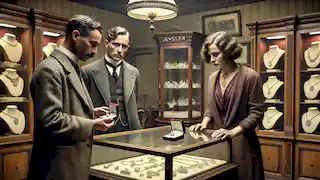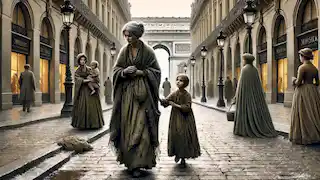Matilda Loisel was one of those pretty and charming girls who are sometimes born, as if by a mistake of destiny, into a family of clerks. She had no dowry, no expectations, no way of being known, understood, loved, or married by any rich or distinguished man. And she let herself be married to a little clerk in the Ministry of Public Instruction. She was simple, but she was as unhappy as though she had married beneath her. Women have neither caste nor race, and their beauty, grace, and charm serve them as birthright, and place them on an equal footing with the grandest ladies.
Matilda suffered ceaselessly, feeling herself born for all the delicacies and luxuries of life. She was distressed by the poverty of her dwelling, by the shabbiness of the walls, the worn-out chairs, and the ugliness of the curtains. All those things, of which another woman of her rank would never even have been conscious, tortured her and made her angry. The sight of the little Breton peasant girl who did her humble housework aroused in her despairing regrets and wild daydreams. She imagined silent antechambers, hung with Oriental tapestry, lit by tall bronze candelabra, and with two great footmen in knee breeches, who dozed in large armchairs under the effects of the heavy warmth of the stove. She imagined vast salons draped in expensive silks, and with fine furniture laden with knickknacks of inestimable value, and inviting smaller rooms, perfumed, made for intimate talks at five o’clock with close friends, with men famous and sought after, whose attentions all women envied and desired.
When she sat down to dinner, at the round table covered with a tablecloth three days old, opposite her husband, who uncovered the soup-tureen and declared with a delighted air, “Ah, the good soup! I don’t know anything better than that,” she imagined delicate meals, gleaming silver, tapestries peopling the walls with ancient figures and strange birds flying in the midst of a fairy forest; and she imagined delicious dishes served on wonderful plates, murmured gallantries listened to with an inscrutable smile while she was eating the pink flesh of a trout or the wings of a quail.
She had neither frocks nor jewels, nothing. And she loved nothing else; she felt herself made for that only. She longed so eagerly to charm, to be desired, to be wildly attractive and sought after.
She had a rich friend, a schoolmate at the convent, whom she did not like to visit, because she suffered so much when she returned. She would weep whole days, with grief, regret, despair, and misery.
One evening her husband returned home with an exultant air, holding a large envelope in his hand.
“Here,” he said, “here is something for you.”
She tore the paper quickly and drew out a printed card, which bore these words:
"The Minister of Public Instruction and Mme. Georges Ramponneau request the honor of M. and Mme. Loisel’s company at the palace of the Ministry on the evening of Monday, January 18th."
Instead of being delighted, as her husband had hoped, she threw the invitation on the table with disdain, murmuring:
“What do you suppose I want with that?”
“But, my dear, I thought you’d be pleased. You never go out, and this is such a great opportunity. I had tremendous trouble to get it. Everyone wants one; it’s very select, and they’re not giving out many invitations. The whole official world will be there.”
She looked at him with an irritated eye and declared impatiently:
“And what do you suppose I am to wear at such a party?”
He hadn’t thought of that. He stammered:
“Why, the dress you go to the theatre in. It seems very nice to me . . .”
He stopped, distracted, seeing that his wife was crying. Two great tears ran slowly from the corners of her eyes toward the corners of her mouth.
“What’s the matter with you? What’s the matter with you?” he faltered.
But with a violent effort she had controlled her emotion and replied in a calm voice, wiping her wet cheeks:
“Nothing. Only I have no dress, and so I can’t go to this party. Give your invitation to some colleague whose wife is better equipped than I am.”
He was heartbroken.
“Come, let us see, Matilda,” he resumed. “How much would it cost, a suitable dress, which you could use again on other occasions—something very simple?”
She reflected for some seconds, making her calculations, and wondering also what sum she could ask without drawing an immediate refusal and a frightened exclamation from the careful clerk.
At last she answered hesitatingly:
“I don’t know exactly, but I think I could manage it with four hundred francs.”
He grew a little pale, for he had been saving just that amount to buy a gun and treat himself to a little shooting next summer on the plain of Nanterre with some friends who went there to shoot larks on Sundays.
But he said:
“Very well. I’ll give you four hundred francs. And try to have a pretty dress.”
The day of the party drew near, and Mme. Loisel seemed sad, restless, anxious. Her frock was ready, however. Her husband said to her one evening:
“What is the matter with you? You’ve been acting strange these last three days.”
And she answered:
“It’s vexing not to have a single jewel, not a single stone, nothing to put on. I shall look like distress. I should almost rather not go to the party.”
“You might wear natural flowers,” said her husband. “They’re very fashionable at this time of year. For ten francs you can get two or three magnificent roses.”
She was not convinced.
“No; there’s nothing more humiliating than to look poor among other women who are rich.”
“How stupid you are!” her husband cried. “Go and find your friend Mme. Forestier and ask her to lend you some jewels. You’re close enough with her to do that.”
She uttered a cry of joy.
“That’s true. I never thought of it.”
The next day she went to her friend and told her of her distress.
Mme. Forestier went to her mirrored wardrobe, took out a large jewel-case, brought it back, opened it, and said:
“Choose, my dear.”

She saw at first some bracelets, then a pearl necklace, then a Venetian gold cross set with precious stones, of exquisite workmanship. She tried on the ornaments before the glass, hesitated, could not make up her mind to part with them, to give them back. She kept asking:
“Haven’t you any more?”
“Why, yes. Look for yourself. I don’t know what you’d like best.”
Suddenly she discovered, in a black satin box, a superb diamond necklace; and her heart began to beat with an immoderate desire. Her hands trembled as she took it up. She fastened it round her throat, outside her high-necked dress, and stood lost in ecstasy at the sight of herself.
Then she asked, hesitating, filled with anxious doubt:
“Will you lend me this, just this?”
“Why, yes, certainly.”
She threw her arms round her friend’s neck, kissed her passionately, then fled with her treasure.
The day of the ball arrived. Mme. Loisel was a great success. She was the prettiest of all, elegant, gracious, smiling, and full of joy. All the men admired her, asked her name, and sought to be introduced to her. All the officials wanted to waltz with her. The Minister noticed her.
She danced madly, ecstatically, drunk with pleasure, with no thought of anything. In the triumph of her beauty, in the glory of her success, in a sort of cloud of happiness made up of all this homage, admiration, and delight, so long dreamed of, and now finally realized, she left the ball about four in the morning. Her husband had been sleeping since midnight in a little deserted anteroom with three other gentlemen whose wives were having too good a time.
He threw over her shoulders the wraps he had brought, modest garments of common life, whose poverty contrasted sharply with the elegance of the ball dress. She was conscious of this and wanted to escape, unseen by the other women who were enveloping themselves in rich furs.
Loisel held her back.
“Wait a bit. You’ll catch cold outside. I’ll go and call a cab.”
But she did not listen to him and rapidly descended the stairs. When they reached the street, they could not find a cab; they began to look for one, shouting after the coachmen they saw at a distance.
They walked down toward the Seine, desperate, shivering with cold. At last they found on the quay one of those old nocturnal cabs that one sees in Paris only after night has fallen, as if they were ashamed to show themselves in the daytime. It took them to their door in the Rue des Martyrs, and sadly they climbed up to their apartment.
It was all over for her. As for him, he reflected that he must be at the Ministry at ten o’clock.
She removed the wraps from her shoulders, standing before the glass, in order to see herself once more in all her glory. But suddenly she uttered a cry. The necklace was no longer round her neck!
“What’s the matter with you?” asked her husband, already half undressed.
She turned toward him, terrified.
“I—I—I’ve no longer got Mme. Forestier’s necklace.”
He started with astonishment.
“What! Impossible!”
They searched in the folds of
her dress, in the folds of the cloak, in the pockets, everywhere. They could not find it.
“You’re sure you had it on when you left the ball?” he asked.
“Yes, I felt it in the vestibule of the Ministry.”
“But if you had lost it in the street, we should have heard it fall. It must be in the cab.”
“Yes. Probably. Did you take his number?”
“No. And you, didn’t you notice it?”
“No.”
They looked, thunderstruck, at each other. At last Loisel put on his clothes.
“I’ll go back on foot,” said he, “over the whole route, to see whether I can find it.”
And he went out. She remained in her ball dress, without strength to go to bed, huddled on a chair, her mind a blank.
Her husband returned about seven o’clock. He had found nothing.
He went to the police station, to the newspapers to offer a reward, to the cab companies, everywhere the faintest suspicion of hope led him. She waited all day long, in the same state of bewilderment at this fearful catastrophe.
Loisel returned in the evening, with his face worn and white; he had discovered nothing.
“You must write to your friend,” he said, “that you’ve broken the clasp of her necklace and are having it mended. That will give us time to turn round.”
She wrote as he dictated.
At the end of a week they had lost all hope.
And Loisel, who had aged five years, declared:
“We must see about replacing the diamonds.”
The next day they took the box that had held the necklace and went to the jeweler whose name was inside. He consulted his books.
“It was not I, madame, who sold that necklace; I must simply have supplied the case.”
Then they went from jeweler to jeweler, searching for another necklace like the first, consulting their memories, both ill with remorse and anguish.

At last they found, in a shop in the Palais Royal, a string of diamonds which seemed to them exactly like the one they had lost. It was worth forty thousand francs. They could have it for thirty-six thousand.
So they begged the jeweler not to sell it for three days yet. And they made a bargain that he should buy it back for thirty-four thousand francs, if they found the other one before the end of February.
Loisel possessed eighteen thousand francs which his father had left him. He would borrow the rest.
He did borrow, asking a thousand francs of one, five hundred of another, five louis here, three louis there. He gave notes, made ruinous engagements, dealt with usurers and all the race of lenders. He compromised his whole existence, risked his signature without even knowing if he could meet it; and, harassed by anxiety for the future, by the blackness of despair which enveloped him, by the prospect of all the privations of body and tortures of soul, he went to get the new necklace, laying upon the jeweler’s counter thirty-six thousand francs.
When Mme. Loisel took back the necklace, Mme. Forestier said to her with a chilly manner:
“You should have returned it sooner; I might have needed it.”
She did not open the case, as her friend had so much feared she would.
If she had noticed the substitution, what would she have thought? What would she have said? Would she not have taken Mme. Loisel for a thief?
Mme. Loisel now knew the horrible life of the very poor. From the very first she played her part heroically. This fearful debt must be paid off. She would pay it. The servant was dismissed. They changed their lodgings; they rented a garret under the roof.

She learned the heavy cares of a household, the odious work of a kitchen. She washed the dishes, wearing down her pink nails on the coarse pottery and the bottoms of pans. She washed the dirty linen, the shirts, and the dishcloths, which she hung on the line to dry; she took the garbage down to the street each morning and brought up the water, stopping for breath at every landing. And, dressed like a poor woman, she went to the fruiterer, the grocer, the butcher, her basket on her arm, bargaining, affronted, defending her miserable money sou by sou.
Every month they had to meet some notes, renew others, obtain more time.
Her husband worked evenings, making up a tradesman’s accounts, and late at night he often copied manuscript for five sous a page.
And this life lasted ten years.
At the end of ten years they had paid everything, everything, with the rates of usury, and the accumulations of the compound interest.
Mme. Loisel looked old now. She had become the woman of impoverished households—strong and hard and rough. With frowsy hair, skirts askew, and red hands, she spoke in a loud voice and washed the floor with great slops of water. But sometimes, when her husband was at the office, she sat down by the window and thought of that evening long ago, of the ball where she had been so beautiful and so admired.
What would have happened if she had not lost that necklace? Who knows? Who knows? How strange life is, how changeful! How little a thing is needed for us to be lost or to be saved!
One Sunday, as she was walking in the Champs Élysées to refresh herself after the labors of the week, she suddenly perceived a woman who was leading a child. It was Mme. Forestier, still young, still beautiful, still attractive.
Mme. Loisel was moved. Should she speak to her? Yes, certainly. And now that she had paid, she would tell her all about it. Why not?
She went up.
“Good morning, Jeanne.”
The other did not recognize her, astonished to be addressed so familiarly by this common person. She stammered:
“But—madame!—I don’t know—You must be mistaken.”
“No. I am Matilda Loisel.”
Her friend uttered a cry.
“Oh! my poor Matilda! How you’ve changed!”
“Yes, I’ve had some hard times since I saw you; and many sorrows . . . and all on your account.”
“On my account! How was that?”
“You remember the diamond necklace you lent me to wear at the Ministry ball?”
“Yes. Well?”
“Well, I lost it.”
“What do you mean? You brought it back.”
“I brought you back another just like it. And for ten years we’ve been paying for it. You know it wasn’t easy for us; we had no money. . . . Well, it’s paid for at last, and I’m glad indeed.”
Mme. Forestier had stopped.
“You say you bought a diamond necklace to replace mine?”
“Yes. You didn’t notice it, then? They were very much alike.”
And she smiled in proud and innocent happiness.
Mme. Forestier, deeply moved, took her two hands.
“Oh, my poor Matilda! But mine was an imitation. It was worth five hundred francs at the most! . . .”




















